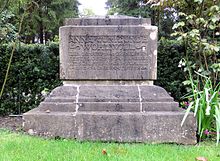Anna Wohlwill
Anna Wohlwill (born June 20, 1841 in Seesen , † December 30, 1919 in Hamburg ) was a German educator .
Live and act

Anna Wohlwill was the daughter of the Jewish school director Immanuel Wohlwill and his wife Friederike Warburg. The father died when she was a child. At the age of six she moved to Hamburg with her widowed mother and four siblings, including Emil and Adolf Wohlwill . As a member of the Warburg family, her mother received help from her relatives there.
Anna Wohlwill attended a school for senior daughters and received training as a teacher from Anton Rée and Otto Jessen . She gained practical experience as an assistant teacher with Johanna Goldschmidt and Amalie Westendarp, who ran the poor school of the women's association to support poor relief. The school and kindergarten of this association were given a building at the pumps in 1866 , which was named after the association's founder Charlotte Paulsen and was called Paulsenstift . Since the institution, which was run on a voluntary basis up until this point, needed permanent teachers and a director, Anna Wohlwill was appointed director in 1866. The former headmistress, Johanna Goldschmidt, resigned from the Paulsenstift in protest against the appointment.
Anna Wohlwill led the non-denominational institution for several decades. During her tenure, the school introduced classes in two foreign languages and a nine-year, later ten-year course. The institution developed into a state-recognized semi-public secondary school for girls. The Senate gave the facility a piece of land on Bülaustraße , on which a new building with 430 schoolgirls could be moved into in 1893. Even when the affiliated women's association broke away from the school, the headmistress continued the tradition of poor relief. By accepting schoolgirls from all social classes and supporting financially disadvantaged children, she tried to balance social differences.
In 1906 Wohlwill celebrated her 40th anniversary with the company. In her honor, a relief foundation was named after her this year. She was also the first woman to receive a gold medal from the Hamburg Senate . Two years later, when the city of Hamburg allowed nurses to work in public poor relief - an office that until then only citizens entitled to vote were allowed to exercise - Wohlwill introduced the new subject, Introduction to Social Aid . For them, social aid meant caring for poor and sick people, child welfare and housekeeping. In the newly created subject, she tried to convey the ideal image of women in social work to girls, and for this reason hired female teachers.
1911 Wohlwill resigned from office. Her successor was Hanna Glinzer . Although Wohlwill became increasingly blind, she was also involved in the school's board of directors in retirement and taught at times.
Her tombstone is in the women's garden at the Ohlsdorf cemetery in Hamburg.
Honor
After her death, Wohlwillstrasse on St. Pauli was named after the former headmistress. Since it was of Jewish faith, the National Socialists renamed it. The street has had this name again since 1948.
literature
- Inge Grolle : Wohlwill, Anna . In: Franklin Kopitzsch, Dirk Brietzke (Hrsg.): Hamburgische Biographie . tape 1 . Christians, Hamburg 2001, ISBN 3-7672-1364-8 , pp. 349-350 .
Web links
- Hans-Dietrich Loose: Wohlwill, Anna on: DasJuedischeHamburg.de
| personal data | |
|---|---|
| SURNAME | Well will, Anna |
| BRIEF DESCRIPTION | German educator |
| DATE OF BIRTH | June 20, 1841 |
| PLACE OF BIRTH | Seesen |
| DATE OF DEATH | December 30, 1919 |
| Place of death | Hamburg |